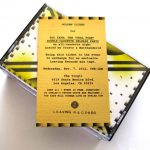You've probably heard by now: it's the 20th anniversary of Dr. Dre's THE CHRONIC. The album has not only stood the test of time, but it's now well regarded as one of the greatest hip-hop albums ever released. Among the recent coverage in the media, SPIN talks to Peanut Butter Wolf about his impressions of the classic.
SPIN: What are your earliest memories of The Chronic?
PBW: For me, The Chronic started with seeing [the album's first single] "Nuthin' but a 'G' Thang" on MTV every damn day. That and "Smells Like Teen Spirit" were the ones that year. I had just gotten signed to Hollywood Records with my friend Charizma and our music was more aligned with groups like Pharcyde and Cypress Hill and Black Sheep, but you couldn't escape The Chronic.
How did the album jibe with Dre's previous music? And how did it fit in with what was happening musically at the time?
It made a lot of sense for Dre to continue what he started with N.W.A. and Eazy E. In the late '80s, the East Coast producers were straight-up sampling different loops and sounds from the bootleg breakbeat series "Ultimate Breaks and Beats." Dre was influenced by East Coast hip-hop production, sampling from the same series, but then he brought in live musicians to play over it or sometimes replay stuff entirely. [Dre's music] was more structured than the East Coast stuff, which was simpler. Then you also had the differences in how people in New York versus Los Angeles listened to their music. In New York, it was straight up Walkmans. Nobody owned a car, so [the emphasis] was more about the lyrics. In the West, it was more about the piercing highs and thundering lows — had to sound good in the car. Dre knew that. And the G-Funk Era was more or less replayed P-Funk, meaning George Clinton. But the main difference between The Chronic and [N.W.A.'s] Straight Outta Compton was that with NWA, it was more of the abrasive-Public Enemy-influenced sound, whereas with The Chronic, it was a smooth, laid back, mellow, harmonic sound. He started really tweaking those high-pitched Moog lines. After The Chronic came out, everybody wanted to mimic that sound.
What influence has The Chronic had on rap in general, and on L.A. rap in particular?
The Chronic was the album to listen to in the studio when working on mixdowns. Every hip-hop producer and studio engineer I knew used it as a litmus test to judge the mixdown of his or her own music. I'm strictly speaking about compression and EQ here — sonics, not content. I used to go to Dan the Automator's studio in San Francisco for my stuff in the mid-'90s and when he was doing Dr. Octagon, I remember him telling me he always played his own stuff against The Chronic. If you listened to Dr. Octagon, you wouldn't say "Oh, that sounds just like The Chronic," but it was influenced by it. And last week when I was in a studio, I joked to the engineer that we should hear this late '60s soul revival band that I was mixing up against The Chronic — and he knew exactly what I was talking about. A day later, you asked me to do this interview and that night, I heard three songs from the album in a club. So [The Chronic] works in the studio, in the car, and in the club. It stands the test of time.
READ THE WHOLE PIECE AT SPIN.COM
Peanut Butter Wolf Drills Down on 'The Chronic': Plus, His Unreleased G-Funk Track!
